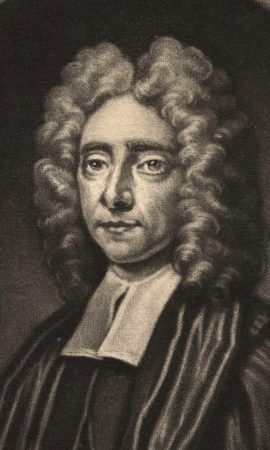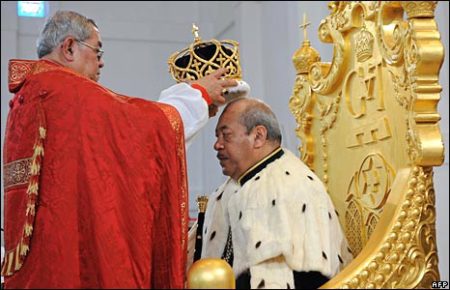 At his blog Faith & Scripture, my friend John interacts with the questions for the reader in chapter 10. The book’s questions and his answers here are in italics.
At his blog Faith & Scripture, my friend John interacts with the questions for the reader in chapter 10. The book’s questions and his answers here are in italics.
1. Does the New Testament in any sense appeal to “mystery” about the Trinity or the trinity? If so, what is meant by “mystery” there?
No it doesn’t, although I now disagree that the Trinity/trinity distinction is operable in that format. The clearest example of mystery in the New Testament to my mind is the inclusion of the Gentiles into God’s people.
I agree, although I don’t understand the “operable” comment.
2. Does the New Testament anywhere mention or refer to a Trinity, or only to a trinity?
Neither, if we are on explicit criteria.
Referring can be using the word “Trinity” or “trinity” or not. I can refer to you as “John” or as ” my friend with the blog.” Surely the NT several times refers to the Father, the Son, and the Spirit, but just not by any one the single term or phrase. So I would say that this triad, this threesome is mentioned, occasionally. Of course it is not implied that they are the same sort of thing, or that they are in some sense a whole.
If we are on the implicit side and we accept that Trinity = The Tri-personal God alone, then God is certainly not referred to with that idea in mind.
Right. There is no mention whatever of a tripersonal god as such. Every term associated with one of the three is used only to refer to a single “Person,” if I can put it that way.
However, Tuggy does not integrate the significance of what he calls small-t trinity in sufficient depth. At another point in the book (sorry I’m going for a speedy post today, so no page reference) he refers to this trinity as “just a triad”. Don’t focus on the word “triad”, when he says this. Focus on “just” and “a”. In my view, that is a wholly inadequate description of the way in which the Jewish-Christian religious semantics underwent a profound reorganisation (“mutation”) through a relatively short number of decades including the divine core itself, which I refer to as the “hub”.
John, you’re overreacting to the word “just” here. In that context the purpose of it is just two let us know that the members of this triad are not necessarily parts that compose some whole, or aspects of some one thing, or even things of the same exact physical status. It is not a comment on the importance of the triad or any member in it. The thing is, the triad might also be a Trinity. The trinitarian will often refer to the members of the Trinity by just listing them, but in those contexts they’re not just a triad, not a mere triad, but also the tripersonal God. You can also refer to that God indirectly, just by using a plural referring term for its members, and some contemporary trinitarian theologians constantly do this. This allows the to say that the Bible is all about “the Trinity” (though the mean, the trinity).
I am afraid that I do not understand the hypothesized reorganization or mutation here. It sounds like you’re trying to come up with a sort of replacement for supposing the Trinity to be a part of first-century belief.
 3. Does it teach that there are three eternal equally divine Persons, the Father, Son, and Holy Spirit, who all together in some sense “are” the one God, Yahweh?
3. Does it teach that there are three eternal equally divine Persons, the Father, Son, and Holy Spirit, who all together in some sense “are” the one God, Yahweh?
No.
OK, so on the assumption that you base your theology on the NT, then you are not a trinitarian.
4. Does it teach that those three Persons share an ousia, and if so, what would the New Testament authors, in their first-century context, mean by that saying that?
This is a difficult question, perhaps a bit like to use the author’s own analogy of wondering what someone from centuries past might have thought of the Internet. Having said that, it is true that Aristotelian ideas of substance, form and matter would have been known to some of the earlier educated Greek converts, although I don’t know how well grounded in those Paul would have been. Interestingly, ousia, or substance, does not appear to be the foundational aspect of a thing. In the Standford Encyclopedia of Philosophy (in which Tuggy is also published, unsurprisingly enough on the Trinity), there is an entry under “Form vs. Matter“. Here it states: “In these cases, the thing that underlies is the matter of the substance”. The substance itself is not the permanent underlier. So the question Tuggy wants to ask of a first-century Christian, assuming he is versed in Greek philosophy is doubly inconceivable since the word ousia does not seem to mean at that point in history what the church would later graft it in to mean and indeed even later adapt (into something eternal).
Right. So the answer to the first question, which is the more important one, seems to be no. Yes, hypothetically they might have meant many things, had they been into various schools of philosophy. But the NT authors don’t seem to have a lot of interest in philosophy.
5. Does it teach the absolute equality of the Father, Son, and Spirit, so that each is eternally unlimited in power, knowledge, and goodness?
No, but there are some important things to note in conditioning this response. Firstly “absolute equality”. We all know that, awkwardly for some, Jesus goes on the record as saying that “the Father is greater than I”, so at least in essential greatness, it is very difficult to go back on Jesus’ own words. How do some Christians do that? Well, the passage in Philippians 2 (which is certainly not ignored in this book) may include part of the answer. The idea is that the full worship and glory can be directed at Christ “to the glory of God the Father”. One of the key building blocks to the “meta-mutation” of the Triune hub is the recognition of the unforeseeable incorporation of the Messiah into the sphere or individuals worthy of worship, as explained in detail by Larry Hurtado (see my summary post here for a good access point into my series). Hitherto, that space was occupied fully by Yahweh. Jesus receives “all authority”. From a New Testament standpoint, the Father’s presence and anointing in his son were quickly proven supreme, such that many of these hitherto presumed unassignable qualities of God were indeed shared with the one whose own (essential, I would say) humility was of equal match.
 But to the Jews they were not absolutely unassignable. Just look at the famous heavenly scene in Daniel 7. Someone else, someone other than the one God comes into his presence and
But to the Jews they were not absolutely unassignable. Just look at the famous heavenly scene in Daniel 7. Someone else, someone other than the one God comes into his presence and
To him was given dominion, and glory and kingship, that all peoples, nations, and languages should serve him. His dominion is an everlasting dominion that shall not pass away, and his kingship is one that shall never be destroyed.
Well, that all sounds like God stuff! It is! It is from him. But the recipient is not the one God. God doesn’t get those goods from anyone! So I think it just mistaken to say that for the Jews it was inconceivable that God should share his authority and glory with another being. This is why the exaltation of Jesus does not entail any fundamental changes in Jewish theology. And this is why we don’t see any big rethinking about the nature of the one God in the NT, and for a long time after.
If you can be as geeky as I am then you may have already tried doing some New Testament word-counts. I have done this on references to God and Jesus. They both number at around 1200. That’s pretty astounding and points to a roughly shared centrality in the New Testament. The Holy Spirit does not fare so well on that criterion although is central on other criteria. Again space here limits me on this, but the primary distinctive that was necessary to make between John the Baptist and Jesus were on the central issue of the Holy Spirit – whose distinction from the Father was an outworking of the going of Christ to “be with the Father” (at his right hand).
You might even say that Jesus is the most central character in the NT. That this is because they’re not rethinking their fundamental theology, but they are rethinking the nature and significance of the Messiah, and how this relates to the gentiles. As to the Spirit, it’s not like he is just a minor character. Is not clear that he is an additional character at all! God’s spirit is a vividly personified several times, but in general the portrayal is like the Old Testament. It lacks a proper name, and is never worshiped. And as a rule, impersonal language is used of it.
On eternality (man, Tuggy’s question is dense!), then the New Testament is significant on one understated point. On awareness and influence of Greek ideas (see also question 4), insufficient work has been done on first-century logos incorporation into Christian discourse. The way in which Jewish writers Paul and his followers (some of whom also wrote epistles), the writer of Hebrews and later, John simply assume the agency role of the logos in creation and sustenance of the universe. This can only mean that that which we have fortunately preserved in detail in the writings of Philo likely knew much wider Jewish acceptance than simply one Alexandrian writer. There has to have been something that Jesus said or was ascribed to him early on for him to “transgress” purely human messianic categories and fit so neatly within this adopted Greek one. The parables of Enoch are a likely part of the answer to this pre-Christ, Jewish-Greek convergence that justify the offhand New Testament references. On the Parables, may I recommend Enoch and the Messiah Son of Man: Revisiting the Book of the Parables, by Gabriele Boccaccini (2007), especially Part 6: “THE DATING”, and the chapter by J.H. Charlesworth “Can we discern the composition date of the Parables of Enoch?” pp. 450-468.
Countless people have looked into the different ways that Greek philosophers use the term Logos. Myself, I have never found it fruitful when it comes to understanding John 1. It seems to me that he’s really using Jewish categories. It is interesting how writers of this period often want to put something in between what is seen and how God really is, and sometimes this is the word of God, and sometimes is the angel of the Lord, etc. I do think this is relevant to understanding the NT, but I would not make the big assumption in the area here, which is unexamined by too many, which is that the Logos supposed to be the pre-human Jesus. When you are reading John in its context there is nothing at all obvious about this. It’s just that because the earlier Logos theorists won c. 3rd c., people think that’s just what it means, their unable to see Iohn 1 without this assumption too.
6. Does the New Testament teach or positively portray the religious worship of:
Father? Yes.
Son? Yes.
Spirit? Not “of”, but “in”.
In other words, No in the case of the spirit.
 Does it teach or show worship of the three of them together, worship of the triune God as such?
Does it teach or show worship of the three of them together, worship of the triune God as such?
There is no Triune God yet – although the New Testament describes a reconfigured hub of the Jewish faith hitherto occupied in its entirety by Yahweh.
I’ve been reading the NT a long time, and have never encountered this “reconfigured hub of the Jewish faith.” In fact, I really have little idea that what you mean. You need to clearly state this thesis without using abstract terms and unexplained metaphors, before you go on to make the case that the NT needs this idea to be understood. Try to say more concretely and precisely what it was, exactly, that in your opinion changed about their belief or practice. Try not to use these words: reconfigure, space, hub, mutation.
7. Does the New Testament teach that the only god just is the Father himself or does it teach that the Father is but one of three Persons “in” God?
The former, although see my other comments above about the reconfigured monotheistic space/hub.
If the one God still is one person, the Father, and we’re talking about a unitarian theology in the new testament. What difference does it make if we go on to talk about this, “hub” thing? In what way are you trying to tweak either a humanitarian or a subordinationist unitarian theology?
8. Does the New Testament make catholic bishops the successors of the apostles, with apostle-level authority to settle questions of Christian doctrine, working together in official, emperor-convened councils?
As the reader now knows, this describes a scenario much later than the New Testament one. Slightly curious question.
If you say yes to this, arguably that gives those councils about the same level of authority as scripture. But we’re both on the Protestant side of this.
…I will, however, before signing-off, highlight two assumptions that I do not feel are good characterisations of the historical data, that may also be where the personal views do interact with the analysis of the data.
Firstly, p. 89, the chapter is wittily entitled “Substance Abuse” and concerns the fourth-century controversies. In the Nicene Creed, it can seem striking that so little is said about the Holy Spirit, but look at Tuggy’s assumption:
The 325 Creed ends with the seeming afterthought: “and in the Holy Spirit”. (p. 89)
Especially in light of his comments elsewhere about the nature of the 325 Creed (its focus is refuting Arianism), it was not attempting to be some kind of eternal declaration that would shape core Christian belief for millennia. Rather, it was clearing up an Arian controversy that messed with Jesus‘ divine status. If Arians were not perceived to contravene the catholic interpretation of the Holy Spirit to the same degree, then it might seem sufficient to provide a simple mention on this occasion.
Well, sure. But the point is that this document is nowhere close to being the landmark trinitarian statement that some people portray it as. Yes, of course, it was only meant to be an occasional document, and at that time no one dreamed that this would be made into the central criterion of orthodoxy. They would have fought much, much harder about it if they thought that was at stake! And frankly the Eusebian side never would have agreed to it if they knew it would be so long lasting.
My second comment follows on from this and a general disagreement about the distinction method (Trinity vs. trinity) described in chapter 3, over which I was lucky to have some dialogue with Dr. Tuggy. I’ll mention that in a second, but first the text of p. 113: What sort of being is “God” supposed to be? Your answer to this will constrain your options when it comes to thinking about the Trinity. The “Trinity” (in the primary sense of the term, as saw in chapter 3) is supposed to be none other than the triune God…”. (p. 113, my emphasis).
 In Dale’s lovely understated tone, I can respond: “Nope”. The use of the word “primary” here is, I believe, quite misleading. Although I still haven’t gotten round to Robert Jenson’s The Triune God, I do value his and Fred Sander’s distinctions of a “primary” from a “secondary” (only explicitly so with Sanders) trinitarianism. So, no, I don’t think we can simply accept that there is only one form of trinitarianism,
In Dale’s lovely understated tone, I can respond: “Nope”. The use of the word “primary” here is, I believe, quite misleading. Although I still haven’t gotten round to Robert Jenson’s The Triune God, I do value his and Fred Sander’s distinctions of a “primary” from a “secondary” (only explicitly so with Sanders) trinitarianism. So, no, I don’t think we can simply accept that there is only one form of trinitarianism,
I’m not sure why you’re talking about kinds of trinitarian theology here. What I was saying was primarily was the use of the term “Trinity” to mean a the triune God of fully developed catholic orthodoxy. Perhaps your point is that the use of “trinity” or “triad” as a plural referring expressions came earlier in Christian history. That is true, but all this argument is about is what is the least confusing, the least misleading way to use these terms, for us, today. Nothing substantial hangs on this. John, I would say they’ve given your view which I think is that NT view, that the one God just is the Father, it would be very misleading to go around talking about “the Trinity.” You’d have to constantly explain that you don’t mean by that what most people mean. In the book I suggest that it is much less misleading to use “trinity” or “triad,” leaving the established use of the capitalized term intact. As you know, the central aim of the book is to reduce the dense confusion, which is in large measure caused by confusing terminology.
which is precisely why Tuggy’s blog and podcast is called trinities. He might point out that this is a reflection that the “Triune-God” presentations are multiple and contradictory in important places (to which I’d agree), but that still doesn’t make that whole tier the primary form – in fact, it divorces them from it. The Triune God is phase 2 of an insufficiently detailed mutation of the religious core of Jewish faith and practice among Christians in the first century. It is thus the secondary (or even later) sense, not the primary.
With the one mighty self Yahweh being the true God, before and after the coming of Jesus, I do not see a core mutation at all, not of basic theology.
… is this triad, small-t trinity, or whatever anything special in Christianity, including Jewish Christianity, or not? In your interview with Sean Finnegan I think you imply that it is special if the Bible might indeed be “all about” the small-t trinity. My Triune Hub hypothesis attempts to provide precisely the “thing” that we need in the absence of a first century Triune God. Expanding on Larry Hurtado’s comments about how central Jesus is to God discourse for the first-century church, the accepted parlance of “mutation” by leading scholars such as Hurtado, Crossan and NT Wright, and the “Jewishness” of some of the sources that even correct misconstrual of Jesus’ baptism with respect to his predecessor John (cf Acts 8:16, Matt 28:19, Didache 7:1 and even “unsuccessful mutation” of GThomas 44:1-3), the mutation I am proposing is that the central religious *space* or focus now includes a consistent articulation with the Son and Spirit. “Personhood” discussions aside, these three appear equally individuated in these significant references and to share **hitherto** (albeit with some conceptual “foreshadowing”) – apperently – unassignable – divine (aka religiously-central) prerogatives.
It seems to me that you are describing mainly changes of practice, that is the worship of the exalted Jesus alongside God, and perhaps a different style of talking about God’s spirit. The big change of belief, is the change in the understanding of the role of God’s unique and Messiah, right? And there’s a changed view about God’s plan for the world, and how Israel and the Messiah fit into that.
I have the impression that you’re groping for a sort of middle ground between unitarianism and trinitarianism. I don’t see why we need that though. You just have humanitarians at first, then a mix of humanitarian and subordinationist unitarians in the next two centuries, with various modalistic monarchians around as well, from the end of the 2nd c. on. On the whole, the situation is quite mixed about the holy spirit, but by the fourth century have the impression that more than not were thinking of this has the third greatest being, along the lines of the second and lesser Logos, to put it crudely. I think this must have helped along by the Greek fashion for triads that clearly influenced theologians in the 100s and 200s. But the miahypostatic side in the 4th c. would have thought the spirit was just an effect or emanation or aspect of God. And we know that the spirit it was still a lively subject of debate even right when it was shutdown in 381.
Before, you’ve expressed incredulity at the idea that mainstream Christianity could go from a unipersonal God to a tripersonal one, in the 4th c. I agree that at first glance, this is a big surprise. But I think I sort of see how it went, in the minds of some of the speculators whose views prevailed. At least, I’m starting to. Long story, though.

@ Dale
I have read the “Free Sample Chapter” (Chapter 1 – Don’t be Afraid to Think about God) of your book, What is the Trinity? Thinking about the Father, Son, and Holy Spirit.
The Creed that is examined and criticized there is exclusively the s.c. “Athanasian Creed”, notoriously apocryphal, and besides, not even considered by the Eastern Orthodox Church.
Are you still trying to make sense of the Nicene-Constantinopolitan Creed of 381? Have you at all considered that it is the fruit of a compromise between the semi-Arians and the neo-Nicene?
Are you aware that the before all worlds (æons) [pro pant?n t?n aion?n] was NOT present in the original Nicene Creed of 325? Are you aware that that confusing clause was first proposed to Emperor Constantine I by no other than Arius, in a letter of 327, and that that suggestion (in which Constantine saw a splendid opportunity for compromise) immediately earned Arius the imperial pardon and return from exile?
Hi Dale,
Thanks so much for this thoughtful and at times challenging response. I’ve responded in some detail on my blog here: http://faithandscripture.blogspot.fr/2017/07/responding-to-dale-tuggy-on-trinitarian.html
Note to “spectators”: Dale has warned that he may not have time for further interaction on this, particularly not in the near future, so please do not interpret his non-response as me simply having some great final word. I don’t, and I’m learning a tonne in the whole process. The conversations must continue!
Blessings,
John
Comments are closed.